Replenishing the soil and restoring balance to the land are the ultimate rewards for a family hooked on regenerative agriculture.
JONATHAN Hurst and his wife, Natalie Hardy, always knew they would end up in the country. They just didn’t foresee their piece of rural paradise would involve such diversity.
Since the pair quit their jobs and escaped from Melbourne 12 years ago with their daughter Ruby, then two, they have established a rural animal enterprise so varied and demanding it makes farming colleagues gasp in disbelief.
As part of family operation Brooklands Free Range Farms at Blampied, in the Central Highlands, the couple — who go by Jono and Nats — today run everything from rare Berkshire pigs and British White cattle to Finn wool sheep and horses.
Nats also produces a range of natural skincare products while Jono runs a part-time garden landscaping business.
If that’s not exhausting enough, they attend an average nine farmers’ markets a month, selling beef, pork and smallgoods.
So how do they maintain such demanding lives? Passion, pure and simple, plus their desire to prove farmers can operate in a more earth-friendly fashion than in the past.
With their British White grass-fed beef taking out gold at this year’s national delicious Produce Awards and their pork growing in popularity, it’s clear their country move is paying dividends.
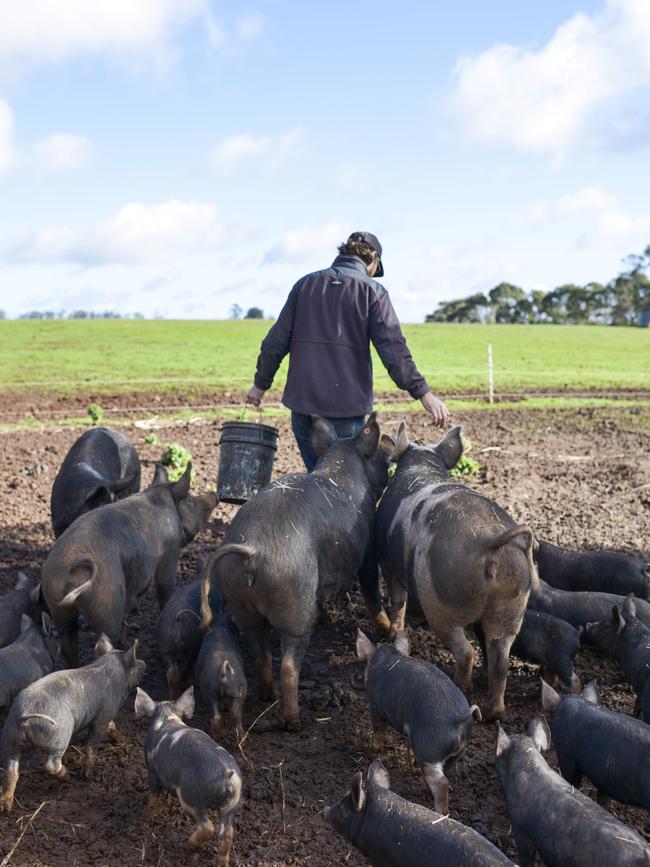
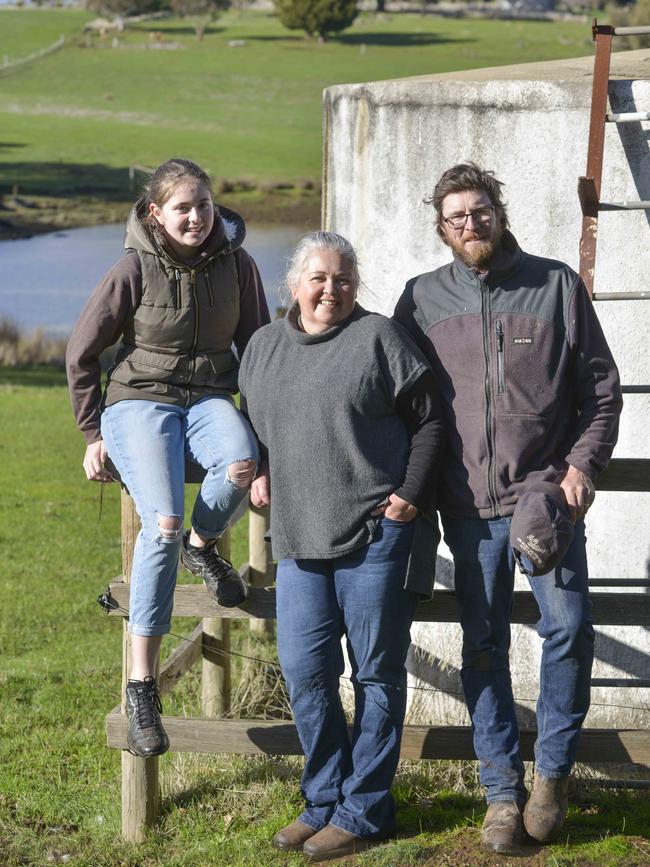
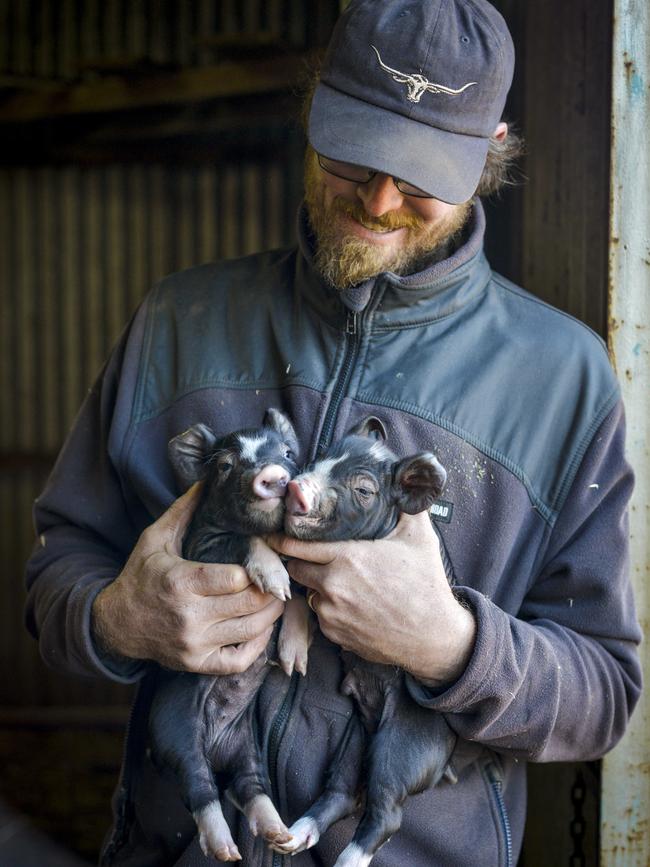
REGENERATIVE CRUSADE
Farming was always on the radar for Jono, raised on a large family farm in New Zealand, and Nats, whose parents owned an 32-hectare property on the Moorabool River near Meredith.
Today they are on a campaign to prove the worth of holistic, chemical-free regenerative farming, adopting many older techniques overlooked after the explosion of chemical solutions in the 1950s.
Their “ground up” approach involves rotational grazing and continually replenishing and building the soil’s carbon content with biological fertilisers and sowing beneficial herbs, grasses and cereal crops.
“Regenerative wasn’t that well known a word when we started,” says Nats, who has an animal health background and worked in hospitality and interior design in London.
“Then came one of those moments, you know. Suddenly I thought, ‘I’ve finally found my groove with people that get with the tribe’ … The thing with regenerative farming is there wasn’t a lot to grab back then, whereas now there’s just so much out there. You can grab it all.
It’s like a big jigsaw puzzle for me … I am listening to all the flow of scientists and others and I’m taking bits from them all.
“It’s like a big jigsaw puzzle for me … I am listening to all the flow of scientists and others and I’m taking bits from them all.”
As part of a local regenerative farming group, Nats and Jono, who previously worked at some of Melbourne’s top restaurants, set up a four-year trial paddock sown with a multi-species cover crop, half of which has been treated with a tea made from worm castings.
The results, they expect, will be positive but already they believe their ongoing regenerative sowing has improved the soil’s water-holding capacity and health.
Two pleasing changes they put down to their chemical-free practices are that hay cutting time has come forward a whole month, and the fact they did not lose topsoil in heavy summer winds.
“The soil is the gut of the earth,” Nats says. “We talk about our guts with microbes and things that break down, and that’s virtually what the soil does. You’ve got your fungi and your microbes in there and if you start spraying you kill all that. Yet that’s what builds up all the soil. So where are you going to get your soil from?
“The topsoil is so important. To keep it there you need to look after it.”
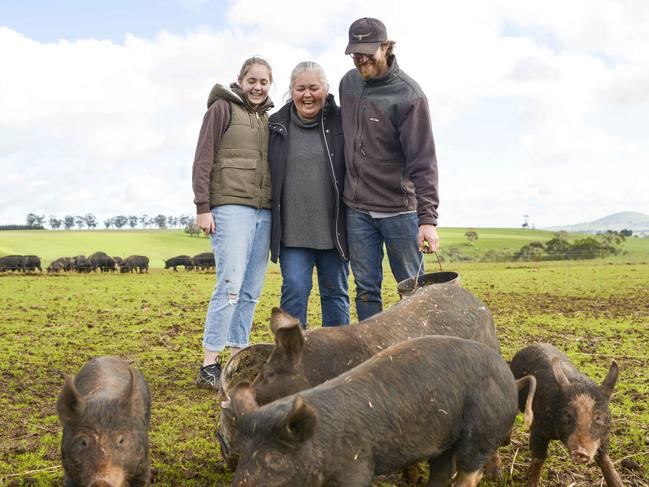
INCREASED HOLDING
Jono and Nats’ country escape started with eight hectares at Springmount between Daylesford and Ballarat.
They sold that to buy 40 rolling hectares at Blampied, bounded by Captains Creek and with views to Mount Kooroocheang, and then several years ago added a 20-hectare property across the road. In addition, they currently lease land at Springmount and have rights to land elsewhere in the region.
“It’s great because we can move the cattle around,” Nats says. “About two months ago Springmount got an inch of rain and we got nothing. So when things like that happen and there is better growth, we can move cattle over there. It also allows us to graze stock elsewhere when paddocks are being planted.”
RARE BRITISH WHITES
Jono and Nats admit they got into British White cattle because they were different, rare and “had a good story to tell”.
“They’re amazing, such stoic animals,” Nats says. “Being white, there’s no photosensitisation issues with their skin. Their feet adapt to whether it’s a dry or a cold season and I think, because they’re an ancient breed, they’re good foragers and grazers.
“They’re slow-growth animals, have no calving problems and are huge milkers, so the calves grow really fast.”
The pair maintains a herd of 16 British White breeding cows plus eight cross Shorthorns, with the marbled meat of the former being sold at several outlets, including Hagen’s Organic butcher at the Prahran Market, and latter via farmers’ markets.
On average, one head of each is sent to market a month. They are continually asked to supply more British White but for the moment demand exceeds supply.
“There’s actually a heritage, wild ancient taste about the meat and people love it,” Nats says.
Both are keen for the breed to become more widespread and are happy to sell breeding animals. “Since we have started with the meat there’s another woman in NSW who has started buying them (she bought one of our bulls) and she’s doing what we’re doing, which is fantastic … We don’t see it as competition. It’s fabulous, keeping the breed alive.”
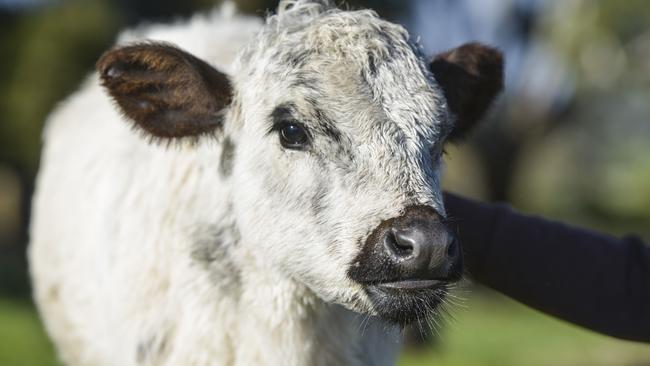
PAMPERED BERKS
Like their British Whites, these driven farmers rate their rare Berkshire pigs as having a good story.
Jono’s favourites, the short-legged English pigs, include about 18 sows and their offspring that range free in 0.2-hectare paddocks.
In addition to pasture, they are treated to regular supplements of spent grain from a local brewery, whey from a local cheesemaker, and a base grain mix with molasses plus occasional treats such as quince cores.
They are maintained on a rotational pasture system, with Jono using a 10-row, steel-wheeled 1960s seeder to apply a mix of grains, cereals, herbs and root vegetables to regenerate paddocks.
We’ve mastered the regen process with the cattle but we still need to do a little better with the pigs … though, we’re getting there.
“We’ve mastered the regen process with the cattle but we still need to do a little better with the pigs … though, we’re getting there,” Nats says.
Currently 10 pigs are processed a month at Tarna Valley Farm at Smythesdale, with the meat of four going to smallgoods.
The remainder is sold as fresh pork at farmers’ markets and nitrate-free ham, bacon and sausages produced by Country Style Smallgoods at Bald Hills, near Ballarat.
Keenly sought are the Christmas hams, with customers already putting orders in for this year.
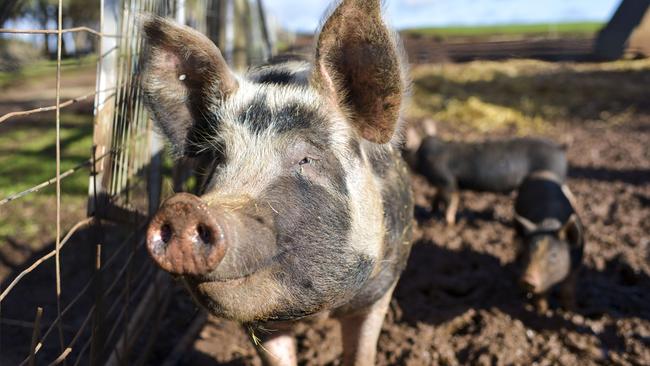
FLEECY FINNS
Like so many things here, Nats’ rare Finn sheep started as “a bit of a hobby”.
With an old shearing shed at their disposal, it seemed a shame not to have sheep, and besides, Nats reckoned someone had to stand up to get these northern European sheep with their highly lustred fleece of varying colours better known.
Today the flock stands at about 28 with 10 registered ewes and one ram, yet due to the breed’s high lambing rate numbers vary.
“They can have up to four lambs at once and some have been recorded here in Australia as having up to six,” Nats says.
“Last year I had 28 lambs from eight ewes with 80 per cent lambing, which is huge.”
Because the lambs are quite small and winters in the area can be icy, she likes to keep them inside for a time.
Initially Jono did the shearing but, as Nats puts it, “he did a really bad job”, so now she uses a professional shearer and sells the wool direct, mainly to hand spinners on Facebook for $3/kg.
She has also branched into selling a few sheep as a side business. “I have discovered that because they are so rare, a ewe is quite an expensive unit and sells for about $600. So it’s turned into something else now.”
RUB A DUB SKIN CARE
With a background in pharmaceuticals and equine herbal medicine, it seemed natural for Nats to get involved in skin products.
“It came about when Ruby was born because I couldn’t find anything that was suitable to put on her little bottom,” she says.
“I just started experimenting with different things … beeswax and things like that. I made a few balms and some friends liked them and I just went from there.
“The philosophy is that if you can’t
eat it, don’t put it on your skin. So it’s all food based.”
Today Nats markets Rub a Dub, which includes soaps, balms and moisturisers aimed at babies and gardeners, online, through select outlets and Farmhouse Direct.
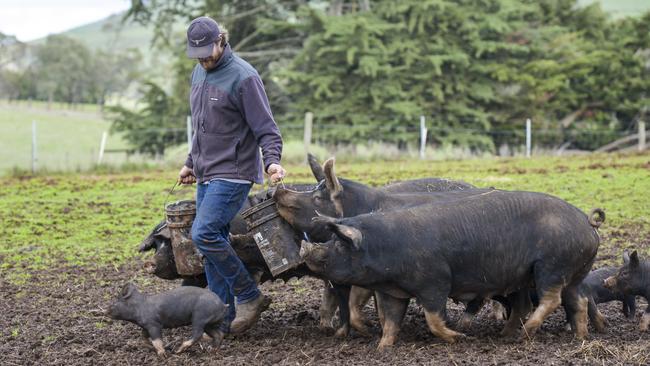
CHANGING FORTUNES
While both admit to cashflow difficulties along the way, often caused by unexpected happenings such as the long illness of Jono’s dad, this year they believe they have turned the financial corner.
“The last year from May to May has been the first solid year of continual income and we can see light at the end of the tunnel,” Jono says.
“We can see what works and the markets are becoming more and more consistent as we build our customer base.”
We never have regrets that we have taken on so much.
They are appreciative of grants, including a Business Victoria Artisanal grant, which will allow the installation of a watering system, yet insist there is still a long way to go.
In the future, they want to open
a farm shop and are looking at expanding distribution through a local food box network.
Otherwise they are ecstatic to have found their rural paradise.
“We love the space here, we love what we do, we love the people and community — and we never have regrets that we have taken on so much.”
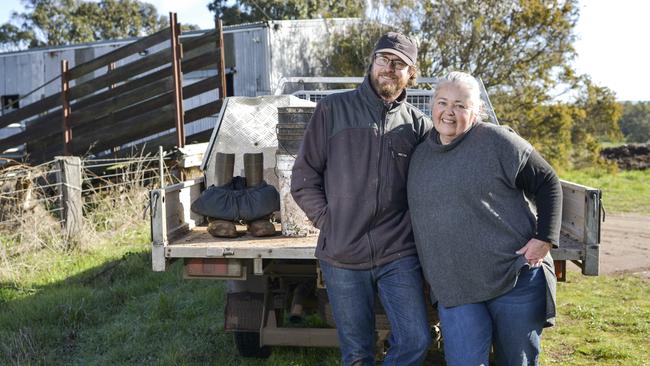
STRONG TEAM
Jono and Nats have faced more than their fair share of obstacles.
“If something goes wrong we just soldier on,” Nats says. “I’ve got a hereditary kidney disease and the doctor told me about a year ago that probably in another five years I would be on dialysis.
“It really hit me and I said to Jono, ‘What do we do?’. We looked at each other and I went, ‘No, bugger it — I can still do this regardless if I have to sit on a machine and have my blood cleaned’.”
Likewise, when Jono fractured his back last year falling off a ladder, they battled on with help from friends.
Their work schedule was also severely hampered due to Jono’s father battling pancreatic cancer. For 18 months they regularly flew back and forth across the Tasman to be with him on the family farm in New Zealand. Sadly he lost his battle and, in the process, Jono and Nats’ cashflow took an alarming dive.
Somewhat surprisingly, it was the banks that came to their aid.
“They were great when Jono’s dad was sick … we needed help and they were fantastic,” Nats says.
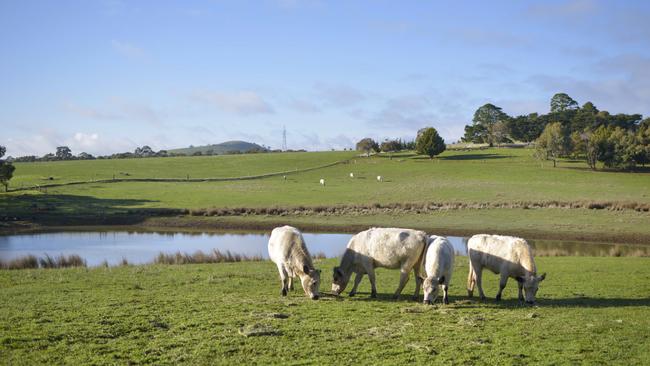
FARM FILE
Brooklands Free Range Farms
Jonathan Hurst and his wife, Natalie Hardy, run rare British White cattle, Berkshire pigs, Finn sheep and horses on their 40-hectare Blampied farm and other properties. Beef, pork cuts and smallgoods are sold wholesale through city and country outlets, to a few local restaurants and at nine farmers’ markets a month. They also sell British White hides. As a side business, Nats produces natural skin care products that are sold online and at local markets.
Where: Blampied, central Victoria
More info: Brooklands Free Range Farms on Facebook

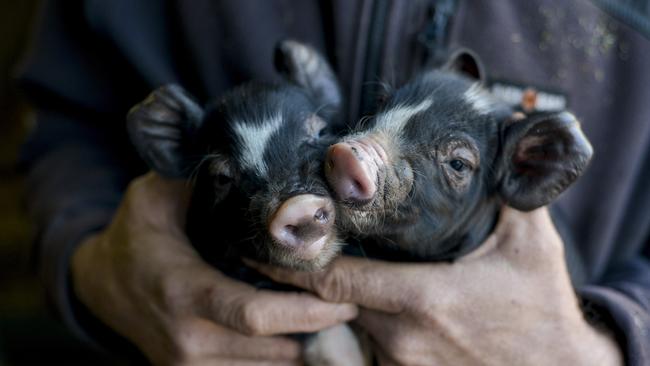
Add your comment to this story
To join the conversation, please log in. Don't have an account? Register
Join the conversation, you are commenting as Logout
Seaweed offers new wave of feed
Dairy cattle on a seafood diet? A seaweed supplement is making a big difference to methane outputs in Tasmania.
Quality, not quantity the key to success
When it comes to award-winning crops, plant health is everything, as these Kyabram brothers can attest.